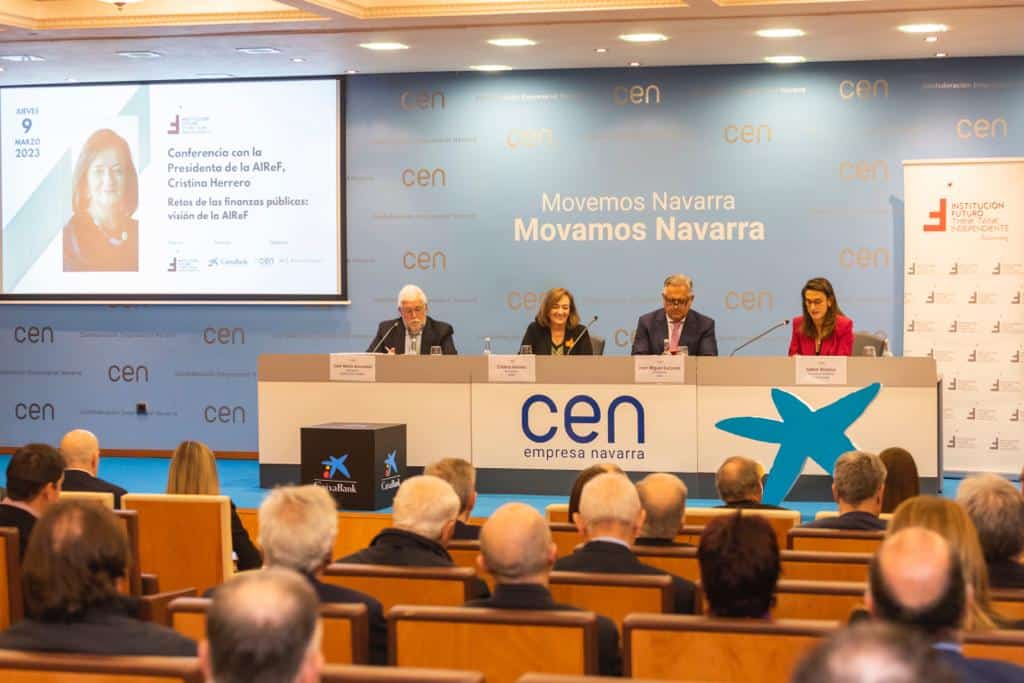
Today the president of AIReF gave a lecture at the “Institución Futuro” in which she stressed the importance of taking advantage of this year to define a strategic vision to respond to the challenges of the future and to prepare for the new scenario that opens in 2024, the first without suspended fiscal rules since the pandemic.
This strategic vision, according to Cristina Herrero, is particularly timely given the country’s political and economic singularities. The electoral processes scheduled for 2023 and the Spanish presidency of the EU are an opportunity to define a medium-term strategy that also offers stability and certainty. In the economic sphere, the challenges associated with the high vulnerability of public finances, the difficulties in recovering pre-pandemic GDP and the effect of population ageing expected in the medium and long term must be addressed.
The year 2023 has started with an upward revision of the growth and inflation outlook, but a worsening of the deficit and public debt forecasts. The most recent developments in the economy suggest that
the most adverse scenarios have been avoided both in Spain and in other European economies. However, in the medium and long term AIReF foresees a challenge of growth and convergence.
AIReF also points out that the reduction in the general government deficit is running out of steam. Although the regional government sub-sector would tend to balance in the medium term, both sectors would emerge from the crisis with higher expenditure and revenue than pre-pandemic levels. In this new context, the President highlighted the uncertainty about the sustainability of the observed increase in revenues in contrast to the downward rigidity shown by expenditure.
As Cristina Herrero recalled, AIReF identifies that the process of reducing public debt has run out of steam. The Autonomous Regions are also accumulating high levels of debt, although there is heterogeneity among them. Navarre is at the lower end of the range, with a debt forecast of 12.1% of GDP for 2023, lower than the rest of the Autonomous Regions except the Basque Country and Cantabria.
All public administrations must be involved
Beyond the medium term, AIReF’s president said that sustainability will be affected by upward pressures from demographics and the change in financial conditions. In this context, she insisted on the need to adopt a strategic vision that considers the expected changes in the European fiscal framework and focuses on long-term sustainability. Furthermore, it should involve all the general government administrations because of their direct contribution to sustainability, their involvement in the implementation of the RTRP funds and the room for improvement in terms of efficiency and effectiveness that can be seen in AIReF’s assessments.
In this respect, Cristina Herrero recalled that AIReF carries out assessments commissioned by both the Central Administration and the Autonomous Regions, including Navarre, which has commissioned a study on healthcare in two phases. The first phase is expected to be delivered by the end of June 2023. In addition to these assessments, AIReF is also commissioned to carry out an annual assessment of the Minimum Income Scheme, an analysis limited to the Autonomous Regions with an ordinary regime.
As a conclusion, the president of AIReF insisted on the need to work in 2023 with a forward-looking vision that responds to the challenges that lie ahead. In her opinion, the new legislatures that are about to begin representing a great opportunity to define a medium-term strategy that can offer stability and certainty. The uncertainty related to the economic outlook should not be used as an excuse.






